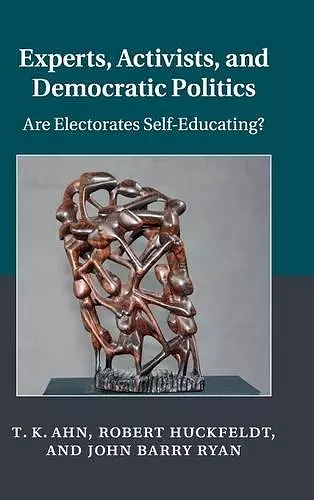Experts, Activists, and Democratic Politics
Are Electorates Self-Educating?
T K Ahn author John Barry Ryan author Robert Huckfeldt author
Format:Hardback
Publisher:Cambridge University Press
Published:13th Nov '14
Currently unavailable, and unfortunately no date known when it will be back

This book addresses opinion leadership in democratic politics as a process whereby individuals send and receive information through their informally based networks of political communication. The analyses are based on a series of small group experiments, conducted by the authors, which build on accumulated evidence from more than seventy years of survey data regarding political communication among interdependent actors. The various experimental designs provide an opportunity to assess the nature of the communication process, both in terms of increasing citizen expertise as well as in terms of communicating political biases.
'This is a landmark book that definitively demonstrates that political opinion formation is critically dependent on informal networks. The combination of experiments and decades of survey data not only makes the book a model of multi-methodological rigor, but also allows the authors to isolate the roots of expertise and opinion bias. This is a must-read for anyone interested in how democracies operate.' Jamie Druckman, Northwestern University
'A masterful, theory-based, experimentally grounded account of how and why the dissemination of political information in politically diverse and inherently biased networks leads citizens - especially those with weak interest and low knowledge - to support policies and candidates that may or may not be in accord with their own objectively defined interests. The primary movers in this process are the 'experts' and 'activists' in everyday life who are motivated both to become informed and to share their viewpoints with others. This is a major contribution to democratic theory accounting for how the arguments of opinion leaders come to permeate public discourse.' Milton Lodge, State University of New York, Stony Brook
'In its rigor and depth of insight into democratic politics, this is an unrivalled study of how citizens influence one another - and for just these reasons, a model of how political science can and should be done.' Paul Sniderman, Stanford University
'Against the onslaught of declarations that modern political life is isolated and anomic, this sparkling analysis of networks and experiments shows how networks of ideas and individuals connect our political activities. Ahn, Huckfeldt, and Ryan weave together network surveys and small group experiments to show how political ideas may spread in daily life as well as what structures enhance or restrict that spread. In the end, they present a very compelling vision of modern political life that encompasses politics in the current century, as well as the last half of the twentieth.' Michael Ward, Duke University
'This book reveals the ways in which pundits, partisans, and political activists are central to forming public opinion and to the resilience of democracy. These biased opinion leaders garner expertise in issues that interest them, and their views are channeled to citizens with little incentive to gather their own information. Anyone seeking to explain public opinion, opinion leaders, partisan bias, political activism, or political communication is going to have to tackle this book. Disputing its findings will be a herculean task. The authors marshal observational data, laboratory experiments, agent-based models, network analysis, and statistical simulations to support their central theoretical claims. The book is an excellent model of social science, using diverse methods to answer well-defined questions.' Rick K. Wilson, Rice University
ISBN: 9781107068872
Dimensions: 231mm x 152mm x 20mm
Weight: 590g
300 pages